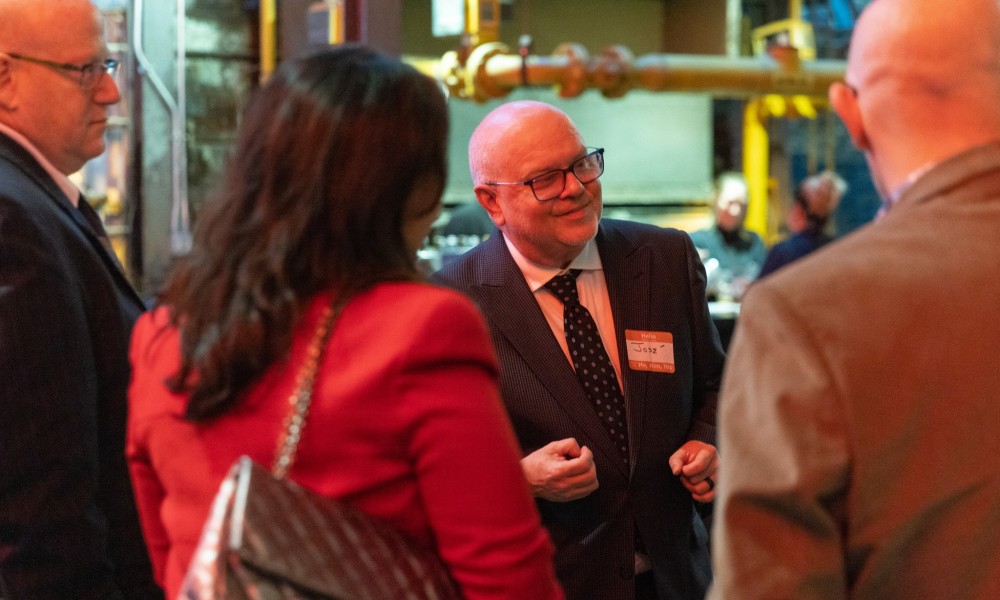
When José Benitez joined Prevention Point Philadelphia as executive director, the public health non-profit committed to serving communities affected by substance use and poverty had 16 employees operating its syringe exchange and other programs out of a Kensington basement. With a budget of $900,000 annually, PPP’s effectiveness was limited by its size and funding. Some believed the struggling organization was in imminent danger of closing.
What a difference 17 years, and a visionary leader, can make. Jose is now departing the organization and the job he describes as “pretty much non-stop the whole time,” with plans to enjoy some much-needed downtime while he figures out where his next challenge lies. He knows the dedicated PPP team will continue to do excellent work.
“Early in my career, someone said harm reduction is love, and that’s what these folks do,” Jose says. “They provide a safe place where people can be who they are and know that the staff is going to take care of them. That’s powerful, and that’s all over our buildings. You walk in and feel the warmth and love the staff delivers.”
With Jose at the helm, PPP has grown into a multi-faceted entity with five facilities, including an emergency shelter; an $18 million budget; and more than 130 staff members who oversee PPP programs, including a wound care clinic, a mobile overdose prevention unit, a police-assisted diversion program, HIV and Hepatitis-C testing and treatment, and an opioid treatment program.
“We asked participants what they needed and developed new programs to fill those needs,” he says. “They said, ‘We want this. Can you help us out with that?’”
The last five years have been especially busy, Jose says. When Jose joined PPP, the organization served about 2,000 people each year. Today it serves almost 40,000.
“There’s been consistent growth but also a lot of uphill challenges when trying to do harm reduction in a space where there’s not a lot of community support,” he says. “People misunderstand harm reduction … I say the options are that HIV rates go up, or we help people, and they don’t. We either want people protected in shelters, off the streets, or we don’t. The data proves that all of these programs work. Our work matters. Harm reduction works.”
Substance use disorder affects people from every walk of life, and Jose thinks it’s important to emphasize that all people have value.
“We see people from well-to-do families, some from the poorest families, and everywhere in between. It’s not about education. It’s not about how much money they have or how much money they make. It’s opioid use disorder and we should frame it that way,” he says. “There’s a misperception that this isn’t a disease … We still do ‘80s thinking in our community, saying that you should punish people rather than treat them and ‘Just say no.’ If it were that simple, people would do it.”
Jose says he’ll be forever grateful to PPP’s funders, who have supported even the organization’s controversial programs. He is proud of the dedicated staff he helped build, “one that’s diverse not only racially but in identity and education. The people we hire range from those with street degrees to those with PhDs and everything in between. … We have people who work for us who were once participants, working as directors now and coordinators and case managers and front-line staff. They started off getting services, and then they didn’t want to go away. They said, ‘I want to give back.’ Those are the things that make you cry, seeing people so committed.”
He is inspired by the people PPP serves, like the woman who used PPP’s services for years before successfully addressing her substance use disorder and finding a home and a job. Or the man who was driving by PPP’s Kensington hub and stopped in to thank Jose and the staff for what they’d done for him. He now had a job, a car, a family.
“We sat down with a cup of coffee and he told me what he went through and how Prevention Point changed his life,” Jose says. “It really reminds me we need to stick to people. One of the things we expect in our society is instant solving of all problems. That’s not how things work.”
Current Associate Director Silvana Mazzella will serve as interim lead executive officer while PPP’s board searches for a permanent replacement. Jose has some tips for his successor.
“Really keep your ear to the ground, talk to the participants and staff and they will guide you and never steer you off course,” he says. “Stay humble while trying to help our harm reduction brothers and sisters throughout the country, sharing our love and expertise.”
And finally, he says, “Find some time to do some self-care. It’s a tough job.”